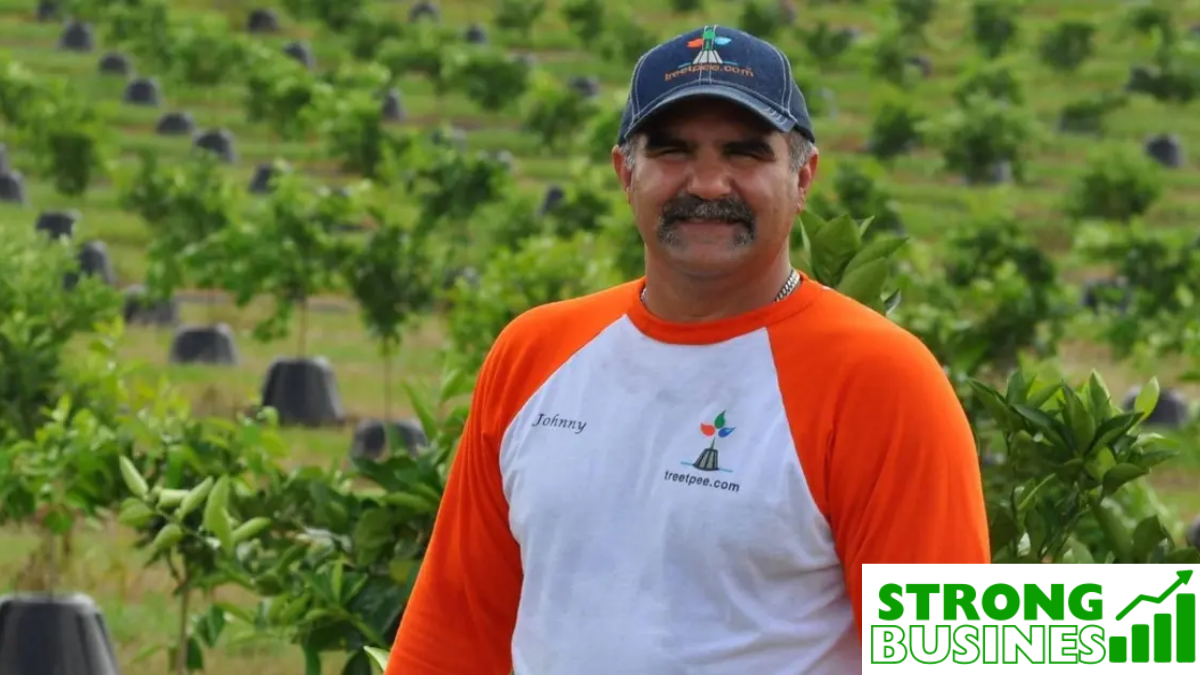Tree T-Pee Net Worth is a revolutionary agricultural product developed to conserve water in the farming industry. Created by Johnny Georges, the device is a cone-shaped, water and nutrient containment system designed to surround the base of a tree. The innovative product gained widespread attention after it was featured on the popular television show “Shark Tank.” What made Tree T-Pee particularly compelling to both farmers and environmentally conscious individuals was its potential to drastically reduce water usage. With water scarcity becoming an increasingly serious global issue, Tree T-Pee entered the market at a time when sustainable practices were more important than ever.
Johnny Georges, a native of Florida, was inspired by his father, a former irrigation specialist who taught him the significance of water conservation in agriculture. The invention of the Tree T-Pee came as a natural extension of his upbringing and experience in the farming world. His goal was simple but ambitious: to help farmers save water and improve crop yields while promoting sustainable agricultural practices. Over the years, the Tree T-Pee has made a notable impact not just in the United States but also in international markets where water conservation is critical for food production.
The Shark Tank Breakthrough
Tree T-Pee gained national attention after Johnny Georges appeared on Season 5 of Shark Tank in 2013. During the pitch, Georges presented his product and shared his vision for revolutionizing water conservation in agriculture. His emotional presentation struck a chord with both the Sharks and the audience. Unlike many other pitches that focused Tree T-Pee Net Worth on financial gains, Georges spoke passionately about the importance of helping farmers, conserving water, and protecting the environment.
Kevin Harrington, one of the Sharks, was particularly moved by Johnny’s story and agreed to invest $150,000 for a 20% stake in the company. This partnership provided Georges not only with financial support but also access to a network of experts, marketing channels, and business opportunities that helped Tree T-Pee scale its operations. The investment allowed the company to boost production, expand its reach, and educate more farmers about the benefits of the product.
Business Model and Product Features
The Tree T-Pee is made from recycled plastic and is designed to fit around the base of young trees. It helps retain water and nutrients by containing them within a small area, directly at the tree’s roots. Traditional irrigation systems can waste a significant amount of water, as much as 25,000 gallons per tree annually. With the Tree T-Pee, this number can drop dramatically to just 800 gallons. This massive reduction in water usage makes the Tree T-Pee a cost-effective and environmentally sustainable choice for farmers.
The device also protects trees from frost and helps maintain soil moisture levels. It encourages deeper root growth and healthier trees by focusing water and nutrients exactly where they are needed. The affordability of the Tree T-Pee and its long-term benefits have made it an attractive solution, particularly for citrus and other fruit growers in water-scarce regions.
Tree T-Pee’s business model centers around selling the product directly to farmers and through agricultural distributors. The company has also partnered with various organizations, educational institutions, and agricultural extension programs to increase awareness and promote its use.
Financial Growth and Current Net Worth
Since its appearance on Shark Tank, Tree T-Pee has grown from a small regional operation to a nationally and internationally recognized brand. Although specific figures regarding the company’s revenue and net worth are not publicly disclosed in detail, industry analysts estimate that Tree T-Pee’s net worth has reached several million dollars. These estimates are based on reported sales growth, distribution expansion, and continued endorsements from industry leaders and environmental organizations.
The estimated net worth of Tree T-Pee is believed to be in the range of $5 million to $7 million as of recent years. This valuation takes into account the product’s unit price, volume of sales, brand value, and expansion into various agricultural markets. The demand for water-saving technologies in agriculture is growing, and Tree T-Pee is well-positioned to capitalize on this trend. Moreover, the success of the product has led to increased brand visibility and interest from both investors and environmental agencies.
Much of Tree T-Pee’s financial success can be attributed to its mission-driven business model. Unlike many startups that prioritize profit margins, Tree T-Pee has consistently focused on impact and sustainability. This authentic approach has helped build trust and credibility among farmers and customers, contributing to its long-term financial growth.
Challenges Faced by Tree T-Pee
Despite its success, Tree T-Pee has faced several challenges over the years. One of the primary difficulties has been scaling production to meet growing demand. Because the product is made from recycled plastic, sourcing consistent raw materials while maintaining quality standards has required careful logistical planning. Additionally, educating farmers—especially those in developing countries—about the benefits of the Tree T-Pee and how to use it effectively has posed challenges.
Marketing has also been a hurdle. The agricultural sector is often resistant to change, and introducing new technologies can take time and effort. Convincing traditional farmers to switch from their conventional irrigation systems to a new method required extensive outreach and demonstration. While appearing on Shark Tank certainly provided a publicity boost, maintaining that momentum in a niche market took continuous innovation and persistence.
Distribution posed another obstacle. Reaching rural farmers, particularly those located in areas with limited infrastructure, was not easy. To overcome this, Tree T-Pee formed partnerships with agricultural cooperatives, local government programs, and NGOs focused on sustainability and food security. These collaborations played a critical role in expanding the company’s footprint.
Social and Environmental Impact
Tree T-Pee’s influence extends far beyond the financial sphere. It has made a substantial social and environmental impact by transforming agricultural practices. By drastically reducing water usage, the Tree T-Pee contributes to environmental conservation and helps mitigate the effects of climate change. In areas experiencing drought or irregular rainfall, the product has helped ensure stable crop yields and food production.
Socially, Tree T-Pee has supported farmers by reducing their operational costs. Water savings translate directly into lower utility bills and reduced labor. This is especially important for small-scale farmers who operate on thin margins and struggle with rising costs. In some regions, Tree T-Pee has become part of community-driven agricultural programs aimed at improving sustainability and food security.
The company has also contributed to the recycling industry by using post-consumer plastic in the manufacturing process. This reduces waste and supports the circular economy. By promoting responsible consumption and production, Tree T-Pee aligns with several of the United Nations Sustainable Development Goals (SDGs).
Expansion and Future Prospects
Tree T-Pee’s success in the U.S. market laid the groundwork for international expansion. The product is now being used in countries such as Mexico, Brazil, and parts of Africa where water conservation is a pressing concern. These markets offer vast potential for growth, particularly in tropical and semi-arid regions where efficient irrigation methods are essential for agriculture.
The company has also explored expanding its product line to include different sizes and variations for various types of crops. There are ongoing efforts to develop biodegradable versions of the Tree T-Pee and integrate smart technology that can track water usage and soil health. These innovations aim to enhance the product’s value and relevance in modern precision agriculture.
Educational initiatives have also become a focus for the company. Johnny Georges frequently speaks at agricultural conferences and universities, sharing his story and promoting sustainability. Tree T-Pee continues to participate in research collaborations to demonstrate the product’s effectiveness through scientific data, which helps bolster credibility among large-scale agricultural businesses and policy-makers.
With climate change intensifying and water scarcity becoming an even greater issue globally, Tree T-Pee is poised for long-term growth. As governments and international organizations push for sustainable farming practices, solutions like Tree T-Pee will likely play a central role in future agricultural strategies.
Conclusion
The journey of Tree T-Pee from a simple idea to a multi-million dollar enterprise highlights the power of purpose-driven innovation. Born out of a deep understanding of agricultural challenges and a commitment to sustainability, Tree T-Pee is more than just a product—it is a movement toward responsible farming and environmental stewardship. Its estimated net worth of $5 million to $7 million reflects not just financial success but also the value it provides to society and the planet.
Johnny Georges’ dedication to helping farmers and preserving natural resources has made Tree T-Pee a symbol of what can be achieved when business goals align with environmental and social good. As the world faces mounting ecological challenges, inventions like Tree T-Pee remind us that practical, scalable solutions do exist. With continued innovation, strategic partnerships, and a focus on education, the future looks promising for both the company and the agricultural communities it serves.
FAQs
What is Tree T-Pee?
Tree T-Pee is a cone-shaped water and nutrient containment system designed to conserve water and promote efficient irrigation for young trees.
Who invented Tree T-Pee?
The Tree T-Pee was invented by Johnny Georges, inspired by his father’s work in agricultural irrigation.
How did Tree T-Pee gain popularity?
Tree T-Pee gained national attention after appearing on the television show “Shark Tank,” where Johnny Georges secured an investment from Kevin Harrington.
What is the estimated net worth of Tree T-Pee?
The estimated net worth of Tree T-Pee Net Worth is between $5 million and $7 million, based on sales, brand value, and market growth.
How does Tree T-Pee benefit the environment?
Tree T-Pee helps conserve water, supports sustainable farming practices, and reduces plastic waste by being made from recycled materials.





